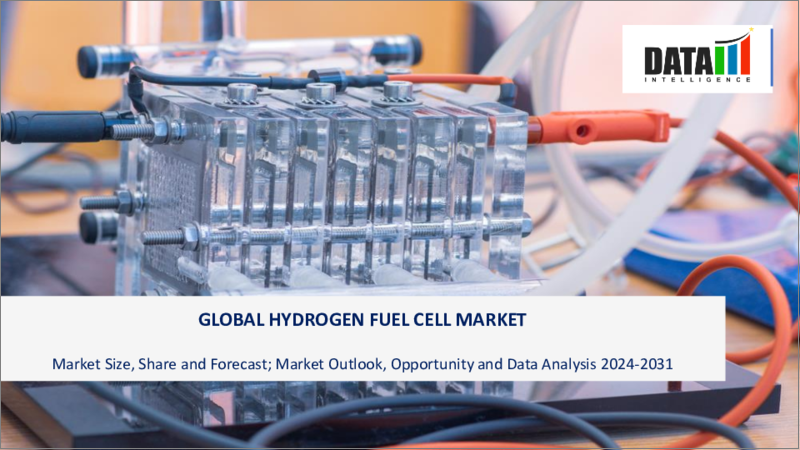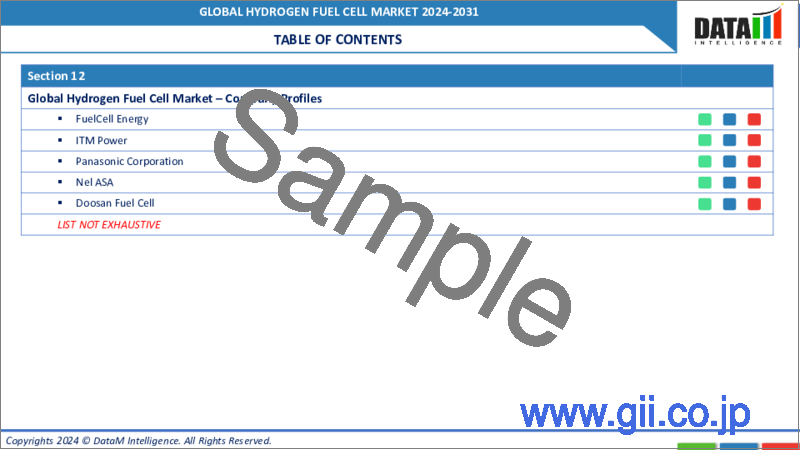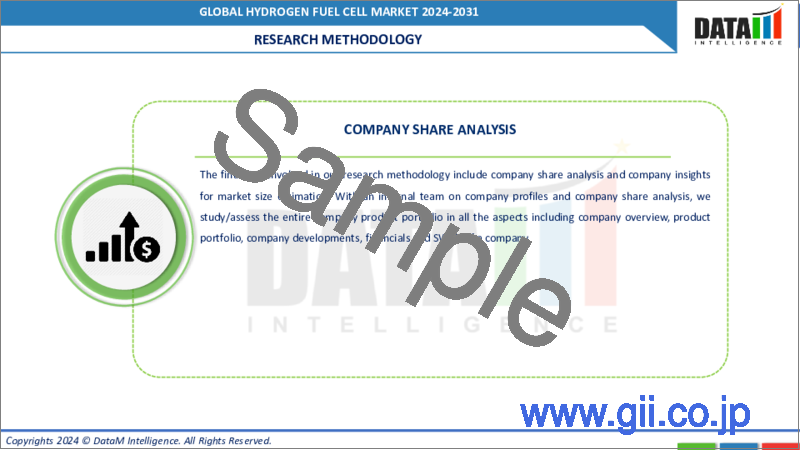|
|
市場調査レポート
商品コード
1325363
水素燃料電池の世界市場-2023年~2030年Global Hydrogen Fuel Cells Market - 2023-2030 |
||||||
カスタマイズ可能
適宜更新あり
|
|||||||
| 水素燃料電池の世界市場-2023年~2030年 |
|
出版日: 2023年08月04日
発行: DataM Intelligence
ページ情報: 英文 195 Pages
納期: 即日から翌営業日
|
- 全表示
- 概要
- 目次
市場概要
世界の水素燃料電池市場は、2022年に31億米ドルに達し、2023-2030年の予測期間中にCAGR 8.3%で成長し、2030年には59億米ドルに達すると予測されています。
水素燃料電池市場の成長にとって、エネルギー貯蔵は水素開発と生産において重要な役割を果たしています。電力は水素燃料電池から生成され、タービンを補完することでハイブリッド電気システムの成長をもたらしています。さらに、世界は燃料電池を動力源とする航空機システムに移行しつつあります。水素分野の技術革新として、エアバス・ゼロエが液体水素を使用する水素燃焼技術に取り組んでいる航空産業がその一翼を担っています。
運輸部門は、世界市場の1/3という圧倒的なシェアを占めています。世界の水素燃料電池市場は、水素燃料の消費が運輸部門に集中しており、有害ガスの排出がゼロです。さらに、再生可能エネルギーと燃料電池の融合は、電力供給に実現可能なソリューションを提供します。燃料電池は、充電が必要な電池のように機能するが、燃料電池を使用する利点は、他のガソリン燃料に比べて平均的に時間がかからないことであり、電力分野への適応をより効率的なものにしています。
市場力学
再生可能エネルギーへの需要の高まり
化学エネルギーを電気に変換するのは、燃料電池が使用する基本的なプロセスです。これらの燃料電池は、商業用や住宅用を含むさまざまな分野で利用できるため、持続可能な燃料、すなわち長期的なエネルギー貯蔵の選択肢となります。水素燃料は発熱量が高く、化石燃料の代替燃料として適しています。
エネルギー資源と水素技術の進歩により、家庭用、商業用、工場用など、さまざまな分野で資源を活用することを目標としています。
コンソーシアムと名付けられた技術は、水素製造のための水分解技術の進歩に焦点を当てています。水素は、クリーンで持続可能なエネルギー資源を使用し、再生可能資源の開発に貢献します。水分解技術コンソーシアムの成長は、80の新しい最先端技術を提供します。
先進水素燃料電池技術導入への投資拡大
水素燃料電池への投資の増加は、技術の進歩、市場機会の創出、商業化に伴う課題の克服において極めて重要です。海洋産業における水素燃料電池技術の成長は、技術の適応において重要な役割を果たしています。Zulu06と名付けられた初の商業貨物輸送船は、水素と燃料電池で運航されています。これは、陸上と海上の両方で脱炭素輸送のための強力な基盤を作るものです。
IPO Greenは、2022年5月17日、水素燃料電池の需要を高める政策やプログラムを開発するための知的財産を支援するイニシアチブを開始しました。WIPO Greenはオンラインプラットフォームであり、テクノロジーが環境ソリューションを交換する場です。水素は、現代自動車が注目しているFCEVにクリーンなエネルギーソリューションを提供します。FCEVは電気自動車に比べてダウンタイムが短いです。
高い燃焼性
世界の水素燃料電池市場で懸念される要因は、着火源があると簡単に発火するガスの高い燃焼性です。水素燃料ステーションを導入する際には、リスクと潜在的危険性を適切に評価する必要があります。水素燃料電池市場では、酸素と水素を組み合わせた燃料を使用し、電気を生成します。FCEVでは、複数の水素燃料タンクが設置され、燃料の需要が増加します。
しかし、水素は引火性が高いため、適切に取り扱う必要があります。水素燃料ステーションでは火災のリスクが高いです。水素燃料電池市場の成長における主な阻害要因。FCEVの燃料は他の資源に比べて高価です。
COVID-19インパクト分析
COVIDの影響後、産業界はクリーンで持続可能なエネルギー源をより重視するようになっています。このため、政府、企業、個人は、大気汚染と気候変動を削減する必要性を理解しています。パンデミック(世界的大流行)の最中、燃料電池市場は金融危機に見舞われ、水素燃料電池プロジェクトの遅れにつながっています。
政府は、持続可能な復興のためのクリーンエネルギーの重要性を認識し、経済と長期的な持続可能性を復活させました。政府は、復興計画に水素燃料電池の条項を盛り込みました。政府はまた、クリーンエネルギーの課題を推進するための景気刺激策に、水素燃料電池の開発を盛り込みました。
ロシア・ウクライナ影響分析
ロシア・ウクライナ紛争は、ガス供給ラインの寸断が予想されるため、天然ガス価格に影響を与えます。戦争は、ガス価格を変動させる水素製造コストに影響を与えます。この紛争により、ロシアからの天然ガス輸入に懸念が生じる。その結果、成長中の水素燃料電池市場が落ち込むことになります。
紛争のため、多くの投資家が燃料電池分野への投資を見送っています。紛争は、燃料ステーションや水素製造を含むインフラ・プロジェクトへの投資を遅らせます。戦争市場の地政学的問題から、水素燃料電池市場の成長と発展が停滞しています。
目次
第1章 調査手法と調査範囲
第2章 定義と概要
第3章 エグゼクティブサマリー
第4章 市場力学
- 影響要因
- 促進要因
- 先進的水素燃料電池技術導入への投資拡大
- クリーンで持続可能なエネルギーソリューションへのシフトの高まり
- 再生可能エネルギーへの需要の高まり
- 抑制要因
- 高いインフラ投資
- 高い引火性
- 機会
- 影響分析
- 促進要因
第5章 産業分析
- ポーターのファイブフォース分析
- サプライチェーン分析
- 価格分析
- 規制分析
第6章 COVID-19分析
第7章 タイプ別
- 固体高分子形燃料電池(PEMFC)
- リン酸型燃料電池(PAFC)
- 固体酸化物形燃料電池(SOFC)
- 溶融炭酸塩燃料電池(MCFC)
- その他
第8章 用途別
- 輸送用
- 据置型
- 携帯型
第9章 地域別
- 北米
- 米国
- カナダ
- メキシコ
- 欧州
- ドイツ
- 英国
- フランス
- イタリア
- スペイン
- その他欧州
- 南米
- ブラジル
- アルゼンチン
- その他南米
- アジア太平洋
- 中国
- インド
- 日本
- オーストラリア
- その他アジア太平洋
- 中東・アフリカ
第10章 競合情勢
- 競合シナリオ
- 市況/シェア分析
- M&A分析
第11章 企業プロファイル
- Ballard Energy Resources
- 会社概要
- 製品ポートフォリオと説明
- 財務概要
- 主な動向
- Bloom Energy
- FuelCell Energy, Inc.
- Hydrogenic Corporation
- Plug Power Inc.
- SFC Energy AG
- NedStack Fuel Cell Technology B.V.
- Doosan Fuel Cell America, Inc
- Nuver Fuel Cells LLC
- Ceres Power Holdings PLC.
第12章 付録
Market Overview
Global Hydrogen Fuel Cells market reached US$ 3.1 billion in 2022 and is expected to reach US$ 5.9 billion by 2030 growing with a CAGR of 8.3% during the forecast period 2023-2030.
For the growth of the hydrogen fuel cells market, energy storage plays a vital role in hydrogen development and production. Electrical power is generated from hydrogen fuel cells that complement turbines which results in the growth of hybrid electric systems. Furthermore, the world is moving towards fuel cell-powered Aircraft systems. As innovation in the hydrogen sector, the Aviation industry takes part in which Airbus Zeroe is working on Hydrogen Combustion technology which uses Liquid Hydrogen.
The transportation sector holds a dominating share of 1/3rd of the global market. The global hydrogen fuel cell market where the consumption of hydrogen fuels is in the transportation sector offers zero emission of harmful gases. Furthermore, the fusion of renewable energy and fuel cells provides a feasible solution for power supply. Fuel cells work like batteries that need to be recharged but the advantage of using fuel cells it take an average less time compared to other gasoline fuels, which makes them more efficient to adapt in the power sector.
Market Dynamics
Growing Demand for Renewable Energy
The conversion of chemical energy to electricity is a basic process used by fuel cells. These cells can be used in numerous ways across multiple sectors, including commercial and residential, making them a sustainable fuel, i.e., a long-term energy storage alternative. Hydrogen fuel has a high calorific value, hence making it a good alternative to fossil fuels.
It has the capability of burning fast at a low temperature when compared to gasoline, making it more efficient, advancements in the technology of energy resources and hydrogen, its goal to utilize resources in several different sectors such as domestic households, commercial and plants.
The technology named consortium focused on the advancement of water-splitting technology for the production of hydrogen. Hydrogen uses clean and sustainable energy resources for the development of renewable resources. The growth of the water-splitting technology consortium offers 80 new state-of-the-art.
Growing Investments in the Adoption of Advanced Hydrogen Fuel Cell Technology
The increasing investments in hydrogen fuel cells are crucial in advancing the technology, creating market opportunities, and overcoming challenges associated with commercialization. The growth of hydrogen fuel cell technology in the marine industry plays a vital role in adapting technology. The first Commercial cargo transport named Zulu06 operates on hydrogen and fuel cells. Which creates a strong base for decarbonized transport in both land and sea area.
IPO Green recently launched an initiative that supports intellectual property for developing policies and programs on May 17, 2022, which increase the demand for hydrogen fuel cells. WIPO Green, it's an online platform where technology exchanges environmental solutions. Hydrogen provides clean energy solutions for FCEV which is being viewed by Hyundai Motors. FCEVs have minimum downtime time compared to electric vehicles.
High Flammability
The factor that concerns in global hydrogen fuel cell market is the high flammability of gas which ignite easily in the presence ignition source. While implementing hydrogen fuel stations proper evaluation of risk and potential hazards should be covered. In the hydrogen fuel cell market, the fuels used are a combination of oxygen and hydrogen which then produce electricity. In FCEV, multiple hydrogen fuel tanks are installed which increases its demand for fuels.
However, Hydrogen is highly flammable so it should be handled properly. In hydrogen fuel stations there is a high risk of fire. The major restrain in the growth of hydrogen fuel cell markets. Fuels in FCEV are expensive compared to other resources because the production of hydrogen is expensive.
COVID-19 Impact Analysis
After the impact of COVID, industries give more importance to clean and sustainable energy sources. Due to this governments, businesses, and individuals understand the need to reduce air pollution and climate change. During the Pandemic fuel cell market phases financial crises which led to delays in hydrogen fuel cell projects.
Since Government recognizes the importance of clean energy for sustainable recovery they revive economics and long-term sustainability. The government included provisions for hydrogen fuel cells in their recovery plans. The government also includes the provision of hydrogen fuel cell development in stimulus packages for advancing clean energy agendas.
Russia-Ukraine Impact Analysis
The Russia-Ukraine conflict affects the price of natural gas due to probable disruption in gas supply lines. War impacts the cost of hydrogen production which fluctuates the gas price. This conflict raises concerns about importing natural gas from Russia. Which results in a downfall in the growing hydrogen fuel cell market.
Due to conflict, many investors Standback their investments in the fuel cell sector. The conflicts delay investment in infrastructure projects including fuel stations and hydrogen production. Due to the war market phases geopolitical issues. Which slow downs the growth and development of the hydrogen fuel cell market.
Segment Analysis
The global hydrogen fuel cell market is segmented based on type, application and region.
Growing Demand For Viable And Simple Fuel Cells Offering Less Greenhouse Gas Emissions in Transportation Sector
The transportation sector covers the highest share in the global hydrogen fuel cell market covering nearly more than 49.9% share in 2022. The growth in an electric vehicle is turned out to be a significant factor in the market growth. Hydrogen is used in fuel cells for the production of electricity in vehicles. In the U.S., more than 6,500 FCEVs are sold and other premier companies also plan to use hydrogen fuel cells in a few couple of years. It has a traveling capacity of 300 to 400 miles on one tank. FCEVs come under zero-emission vehicles and there is less emission of greenhouse gas.
Fuel Cell technology draws major attention due to its viability, and simplicity. Honda, Toyota, and Hyundai were major automobile brands that utilized mass hydrogen fuel cells. Decarbonization is an aid to produce the transportation sector for heavy-duty vehicles such as trucks. Fuel cells offer good advantages compared to other combustion engines as they are small in size and there are no environmental effects. Due to fuel cells' advantages in the automobile sector the demand for hydrogen increases.
Geographical Analysis
Growing Asia-Pacific Government Investment in the Adoption Of Hydrogen Fuel Cell
Asia-Pacific holds a significant share of the global hydrogen fuel cell market and rising government investments in the adoption of clean energy is a major market driving factor. For the development of fuel cell technology, China had various policies over a few years that increase the growth of fuel cell vehicles. For saving energy China government publish New Energy Vehicle RoadMap 2.0 in 2020 for commercializing vehicles using fuel cells. The government of China publishes news and policies regarding pilot applications that switch from subsidy policy to support policy.
Furthermore, South Korea launches a hydrogen economy plan which includes 6.2 million fuel cell vehicles by 2040. The overall sales of the fuel cell market were marked at the end of 2021 which was up to 19,000. India has also shown immense interest in the market in past years. A similar initiative is taken in India by our former prime minister 'Mr. Narendra Modi' to ensure the vision of hydrogen fuel is important in making it under the initiative of 'Atma Nirbhar Bharat' by making it affordable and accessible to every reach for clean energy and meeting the climate change goal and providing new jobs and opportunities to people.
Competitive Landscape
The major global players in the market include Ballard Energy Resources, Bloom Energy, FuelCell Energy, Inc., Hydrogenic Corporation, Plug Power Inc, SFC Energy AG, NedStack Fuel Cell Technology B.V., Doosan Fuel Cell America, Inc, Nuver Fuel Cells LLC and Ceres Power Holdings PLC.
Why Purchase the Report?
- To visualize the global hydrogen fuel cell market segmentation based on the type, application and region, as well as understand key commercial assets and players.
- Identify commercial opportunities by analyzing trends and co-development.
- Excel data sheet with numerous data points of hydrogen fuel cell market-level with all segments.
- PDF report consists of a comprehensive analysis after exhaustive qualitative interviews and an in-depth study.
- Product mapping available as Excel consisting of key products of all the major players.
The global hydrogen fuel cell market report would provide approximately 50 tables, 49 figures, and 195 Pages.
Target Audience 2023
- Manufacturers/ Buyers
- Industry Investors/Investment Bankers
- Research Professionals
- Emerging Companies
Table of Contents
1. Methodology and Scope
- 1.1. Research Methodology
- 1.2. Research Objective and Scope of the Report
2. Definition and Overview
3. Executive Summary
- 3.1. Snippet by Type
- 3.2. Snippet by Application
- 3.3. Snippet by Region
4. Dynamics
- 4.1. Impacting Factors
- 4.1.1. Drivers
- 4.1.1.1. Growing Investments in the Adoption of Advanced Hydrogen Fuel Cell Technology
- 4.1.1.2. Growing Shift Towards Clean and Sustainable Energy Solutions
- 4.1.1.3. Growing Demand for Renewable Energy
- 4.1.2. Restraints
- 4.1.2.1. High Investment in Infrastructure
- 4.1.2.2. High Flammability
- 4.1.3. Opportunity
- 4.1.4. Impact Analysis
- 4.1.1. Drivers
5. Industry Analysis
- 5.1. Porter's 5 Force Analysis
- 5.2. Supply Chain Analysis
- 5.3. Pricing Analysis
- 5.4. Regulatory Analysis
6. COVID-19 Analysis
- 6.1. Analysis of COVID-19
- 6.1.1. Scenario Before COVID
- 6.1.2. Scenario During COVID
- 6.1.3. Scenario Post COVID
- 6.2. Pricing Dynamics Amid COVID-19
- 6.3. Demand-Supply Spectrum
- 6.4. Government Initiatives Related to the Market During the Pandemic
- 6.5. Manufacturers' Strategic Initiatives
- 6.6. Conclusion
7. By Type
- 7.1. Introduction
- 7.1.1. Market Size Analysis and Y-o-Y Growth Analysis (%), By Type
- 7.1.2. Market Attractiveness Index, By Type
- 7.2. Proton Exchange Membrane Fuel Cells (PEMFC)*
- 7.2.1. Introduction
- 7.2.2. Market Size Analysis and Y-o-Y Growth Analysis (%)
- 7.3. Phosphoric Acid Fuel Cells (PAFC)
- 7.4. Solid Oxide Fuel Cells (SOFC)
- 7.5. Molten Carbonate Fuel Cells (MCFC)
- 7.6. Others
8. By Application
- 8.1. Introduction
- 8.1.1. Market Size Analysis and Y-o-Y Growth Analysis (%), By Application
- 8.1.2. Market Attractiveness Index, By Application
- 8.2. Transportation*
- 8.2.1. Introduction
- 8.2.2. Market Size Analysis and Y-o-Y Growth Analysis (%)
- 8.3. Stationary
- 8.4. Portable
9. By Region
- 9.1. Introduction
- 9.1.1. Market Size Analysis and Y-o-Y Growth Analysis (%), By Region
- 9.1.2. Market Attractiveness Index, By Region
- 9.2. North America
- 9.2.1. Introduction
- 9.2.2. Key Region-Specific Dynamics
- 9.2.3. Market Size Analysis, and Y-o-Y Growth Analysis (%), By Type
- 9.2.4. Market Size Analysis, and Y-o-Y Growth Analysis (%), By Application
- 9.2.5. Market Size Analysis, and Y-o-Y Growth Analysis (%), By Country
- 9.2.5.1. U.S.
- 9.2.5.2. Canada
- 9.2.5.3. Mexico
- 9.3. Europe
- 9.3.1. Introduction
- 9.3.2. Key Region-Specific Dynamics
- 9.3.3. Market Size Analysis, and Y-o-Y Growth Analysis (%), By Type
- 9.3.4. Market Size Analysis, and Y-o-Y Growth Analysis (%), By Application
- 9.3.5. Market Size Analysis, and Y-o-Y Growth Analysis (%), By Country
- 9.3.5.1. Germany
- 9.3.5.2. UK
- 9.3.5.3. France
- 9.3.5.4. Italy
- 9.3.5.5. Spain
- 9.3.5.6. Rest of Europe
- 9.4. South America
- 9.4.1. Introduction
- 9.4.2. Key Region-Specific Dynamics
- 9.4.3. Market Size Analysis, and Y-o-Y Growth Analysis (%), By Type
- 9.4.4. Market Size Analysis, and Y-o-Y Growth Analysis (%), By Application
- 9.4.5. Market Size Analysis, and Y-o-Y Growth Analysis (%), By Country
- 9.4.5.1. Brazil
- 9.4.5.2. Argentina
- 9.4.5.3. Rest of South America
- 9.5. Asia-Pacific
- 9.5.1. Introduction
- 9.5.2. Key Region-Specific Dynamics
- 9.5.3. Market Size Analysis, and Y-o-Y Growth Analysis (%), By Type
- 9.5.4. Market Size Analysis, and Y-o-Y Growth Analysis (%), By Application
- 9.5.5. Market Size Analysis, and Y-o-Y Growth Analysis (%), By Country
- 9.5.5.1. China
- 9.5.5.2. India
- 9.5.5.3. Japan
- 9.5.5.4. Australia
- 9.5.5.5. Rest of Asia-Pacific
- 9.6. Middle East and Africa
- 9.6.1. Introduction
- 9.6.2. Key Region-Specific Dynamics
- 9.6.3. Market Size Analysis, and Y-o-Y Growth Analysis (%), By Type
- 9.6.4. Market Size Analysis, and Y-o-Y Growth Analysis (%), By Application
10. Competitive Landscape
- 10.1. Competitive Scenario
- 10.2. Market Positioning/Share Analysis
- 10.3. Mergers and Acquisitions Analysis
11. Company Profiles
- 11.1. Ballard Energy Resources*
- 11.1.1. Company Overview
- 11.1.2. Product Portfolio and Description
- 11.1.3. Financial Overview
- 11.1.4. Key Developments
- 11.2. Bloom Energy
- 11.3. FuelCell Energy, Inc.
- 11.4. Hydrogenic Corporation
- 11.5. Plug Power Inc.
- 11.6. SFC Energy AG
- 11.7. NedStack Fuel Cell Technology B.V.
- 11.8. Doosan Fuel Cell America, Inc
- 11.9. Nuver Fuel Cells LLC
- 11.10. Ceres Power Holdings PLC.
LIST NOT EXHAUSTIVE
12. Appendix
- 12.1. About Us and Services
- 12.2. Contact Us






